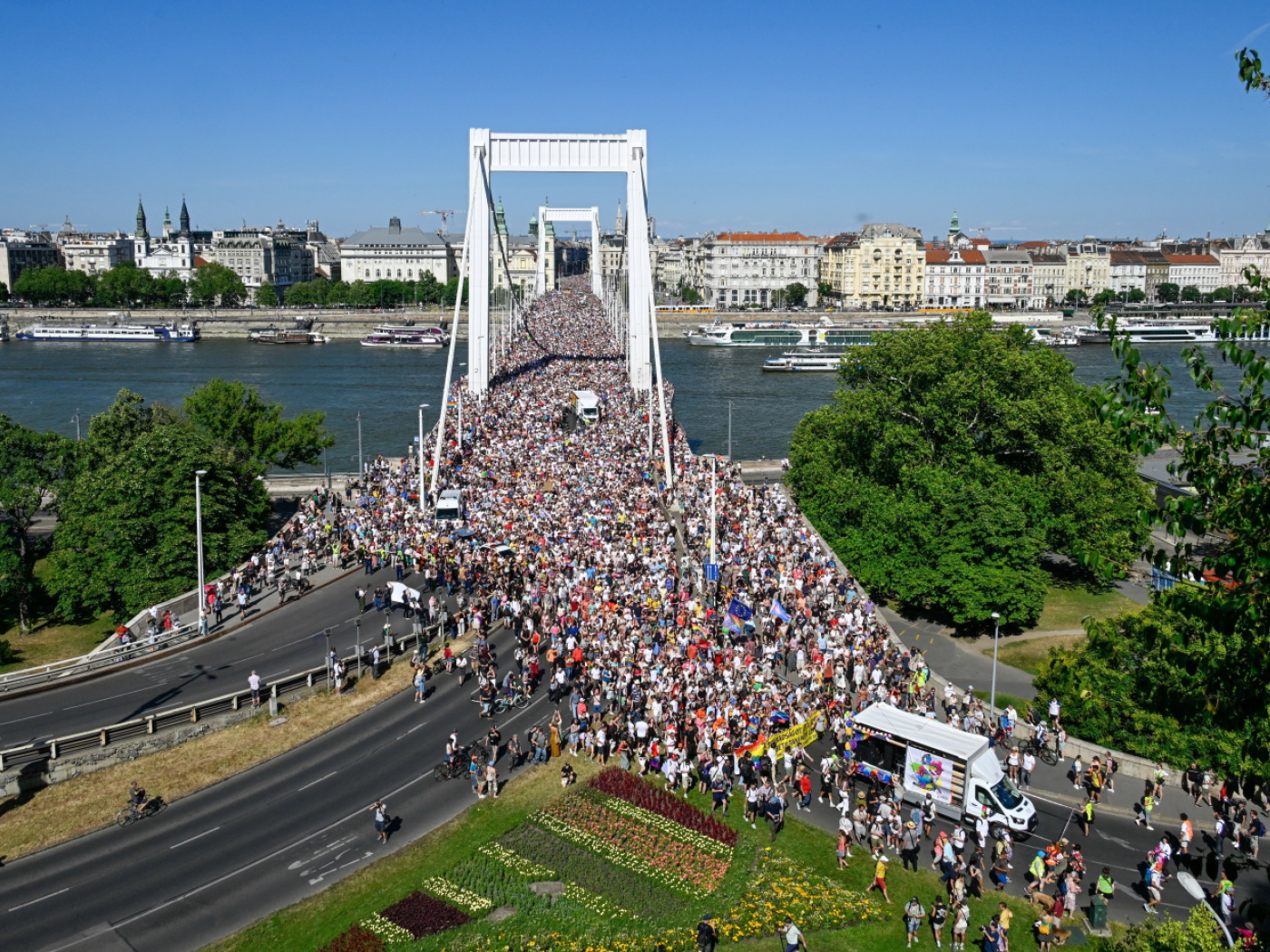
Keystone-SDA
In a festive atmosphere, an immense crowd paraded on Saturday in Budapest, defying the prohibition by the police of the pride march, a record mobilization in reaction to an unprecedented regression of LGBT+ rights in the EU.
(Keystone-ATS) If no official figure is available, the organizers estimated nearly 200,000 the number of participants, the places and avenues along the course being black in the world.
For Prime Minister Viktor Orban and his Fidesz party, “this major success of the pride is very embarrassing” and will have “repercussions” political, commented for AFP the analyst Szabolcs Pek.
The procession was shaken around 3:00 p.m. near the town hall of the capital adorned with rainbow colors, under a blazing sun, and the last ones arrived at their destination four hours later.
Among the demonstrators, many say they participate in their first pride march, like Zoltan, 66. “I am proud to be gay and I am very afraid that the government would like to lower us. I am surprised that there are so many people, ”he says, very moved.
Marcell Szanto, a 22 -year -old student and “hetero ally” of the LGBT+community, salutes “a great experience”, far from “hate usually characterizing the atmosphere in Hungary”.
“Defending the rights of the people”
“Freedom and love cannot be prohibited!” “: The message is large in a city in full swing, under the surveillance of the police and without tensions at this stage, while the far-right counter-demonstrators were few.
The nationalist leader Viktor Orban wanted to avoid the images of violent repression: Friday, he had dismissed any intervention of the police, while threatening gays, lesbians and transgender with a posteriori legal consequences.
Because throughout Europe, the eyes are on this country of 9.6 million inhabitants who attracted the wrath of the European Commission with this ban recalling those of Moscow in 2006 and Istanbul in 2015.
“The danger is there. An reactionary international arrives before our eyes, in the United States, Hungary, Italy, in Russia, “said the representative of the Aid association during a pride march in Paris, where thousands of participants gathered on Saturday.
After the support displayed by 33 countries to this demonstration, the Minister of Justice warned diplomats in Budapest that if they participated in this prohibited event, they should assume the consequences.
At least 70 MEPs announced their presence “to tell Viktor Orban that we will not tolerate that he dismantles the European project”, in the words of French Raphaël Glucksmann, who called on the EU to “put a stop” to the nationalist leader.
Cameras had been installed upstream and facial recognition could allow the authorities to distribute fines of up to 500 euros, while organizing or calling to participate is liable to one year in prison.
According to the government, minors should not be exposed to homosexuality and transidentity, and even less to “debauchery” scenes.
In addition to the law adopted in mid-March aimed at banning such rallies, he went so far as to modify the Constitution to ensure his rear. He affirms the best interests of the child to justify his questioning of the freedom to demonstrate.
“Goal against his camp”
“Thank you, Viktor Orban, for promoting a more tolerant society,” said Budapest’s ecologist mayor, Gergely Karacsony, who decided to keep the pride against all against everything on Facebook.
“Instead of scoring points”, the government “scored a huge goal against its camp attempting to prevent the event today,” added another opponent, Peter Magyar, in the lead in the polls before the legislative elections for spring 2026.
Encouraged by Donald Trump’s offensive against diversity promotion programs, Orban hoped to “polarize society”, according to political scientists, a recipe that had worked well in the past.
Before the return to power in 2010 of Viktor Orban, Hungary was one of the most defenders of LGBT+ rights in the region: homosexuality had been decriminalized there from the early 1960s and the civil union between same -sex spouses recognized in 1996.
But the head of government, cantor of “illiberalism”, gradually changed the situation.
“It is disgusting, it has become a fashion to show off,” said AFP under the cover of anonymity Katalin, a resident in favor of the ban.

